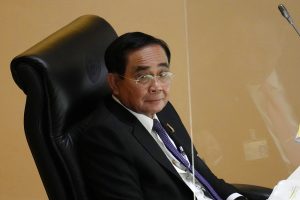Thailand’s Constitutional Court ruled Wednesday that Prime Minister Prayut Chan-o-cha must suspend his active duties while the court decides whether he has overstayed his legal term in office.
It was not immediately announced who would assume his duties as acting prime minister. Under law, it would be Deputy Prime Minister Prawit Wongsuwan, who is ranked first among several deputies. He is a close political ally of Prayut and part of the same military clique that staged the 2014 coup that initially brought him to power.
The court agreed unanimously that there is reason to consider a petition from opposition lawmakers arguing he has exceeded his term limit and should step down. By a vote of 5 to 4, the court agreed to suspend Prayut from his duties effective Wednesday until it reached a decision.
The court’s decision was announced in a statement after the news was leaked to Thai media. The statement did not mention if Prayut can retain his concurrent post of defense minister.
The court’s announcement said Prayut must submit his defense within 15 days of receiving a copy of the complaint.
The court did not say when it would rule on whether Prayut has breached the clause in the constitution on the eight-year limit as prime minister. If it rules that he did, he would lose his post right away.
Prayut led a military coup that ousted an elected government in May 2014. His critics contend the eight years expired Tuesday, the day before the anniversary of Prayut officially becoming prime minister in the military government installed after the coup. Prayut’s supporters contend his term in office started later.
They say his time should be counted from when the current constitution, which contains the provision limiting prime ministers to eight years, came into effect on April 6, 2017. Another interpretation favoring his continuing tenure starts counting from June 9, 2019, when Prayut took office under the new constitution following a 2019 general election.
The possibility that the court might decide against Prayut is considered slight because it has generally ruled in the government’s favor in a slew of political cases. But a ruling in his favor risks invigorating a protest movement against him and reopening fissures in Thai politics over the past 15 years that have sometimes bred violence.
His replacement by Prawit would likewise not mollify critics.
Prawit, 77, heads the ruling Palang Pracharath party, which was formed as a proxy for the army’s interests in the 2019 election. He was tainted by a scandal involving a collection of luxury watches that he could not afford on a military or government salary. However, the state anti-corruption body — largely seen as being sympathetic to the government — ruled in 2018 that his defense that the watches were borrowed was true, so he had not violated the law by failing to declare them as assets.
Whether Prawit would actually take the prime minister’s job is not clear. Prawit has publicly acknowledged his health is not good and is better known as a behind-the-scenes political organizer.
If he is not forced out of office, Prayut must call a new election by March next year, though he has the option of calling one before that.
Polls show the prime minister’s popularity is at a low ebb. He has been accused of mishandling the economy and botching Thailand’s response to the COVID-19 pandemic.
In 2020, thousands of people took to the streets in multiple protests to demand that Prayut and his Cabinet resign. They charged that he came to power illegitimately, while also calling for the constitution to be amended and the monarchy to be reformed.
The student-driven protest movement at one point attracted crowds of 20,000-30,000 in Bangkok.
Several confrontations with the authorities grew violent. A legal crackdown on activists, arrested in many cases under a law against insulting the monarchy because of their criticism of the royal institution, has embittered Prayut’s critics more.
Small protests appealing again to Prayut to step down and the Constitutional Court to force him to if he didn’t have been held daily since Sunday. The major faction of the protest movement, calling itself Ratsadon — The People — issued a statement Sunday affirming its call for Prayut’s ouster.
“For more than eight years, Thai society has fallen under the darkest and most bitter times. A period under the rule of a tyrant who took power away from the people. A tyrant who inherits power through a mechanism without democratic legitimacy,” the statement said. It declared that the Constitutional Court “must listen.”
“We, the people, are hopeful that deep down, you, and General Prayut’s cronies will come to your senses and realize that the time of General Prayut as prime minister of Thailand has come to an end according to the 2017 constitution of Thailand.”
The eight-year term limit was meant to target former Prime Minister Thaksin Shinawatra, a populist billionaire who was ousted by a 2006 military coup but whose political machine remains powerful. In 2014, the army also ousted the government of Thaksin’s sister, Yingluck Shinawatra, who was forced from office shortly before the takeover by a controversial court decision.
Court rulings have forced three prime ministers associated with Thaksin from office, including Yingluck.
Thailand’s traditional conservative ruling class, including the military, felt that Thaksin’s popularity posed a threat to the country’s monarchy as well as their own influence. The courts have been stalwart defenders of the established order and ruled consistently against Thaksin and other challengers.

































